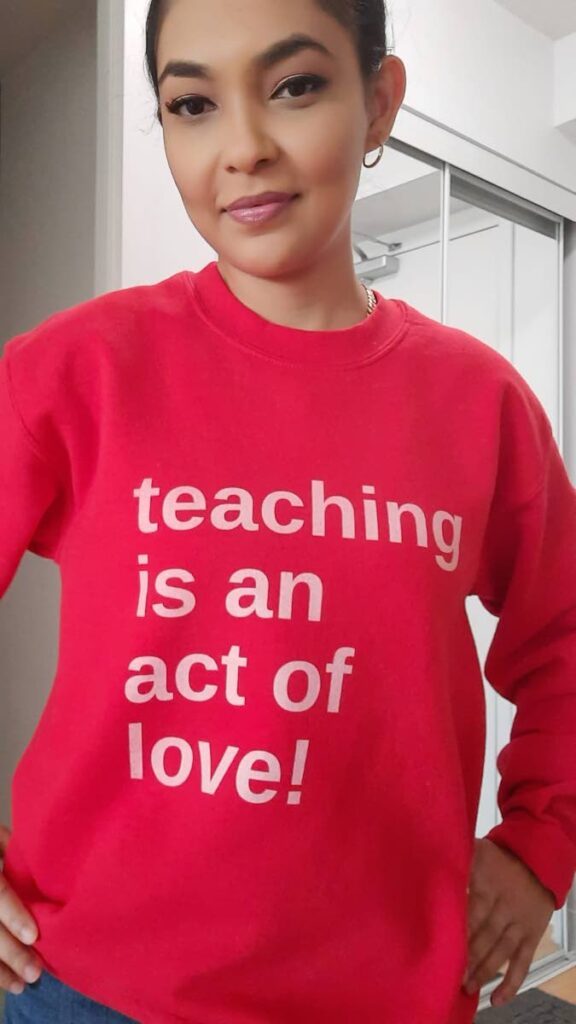Transforming education to save lives

MARIELLE SHELLI KARAMAT
WE ARE proud and pleased as a nation to update our coat of arms, declaring how “post-colonial” we are. Still, it’s just another act of performativity that has not resulted in or reflected any real cultural change or shift from colonial ideals and practices in Trinidad and Tobago.
I was born in Trinidad and spent my formative years there, hailing from a lineage of educators. While I no longer live in Trinidad I still consider it home and always will. I want to see my people and country prosper and thrive, especially our young people.
My parents and my grandfather were teachers. Many of my relatives are educators in Trinidad and cannot voice their concerns about the system. I’m in my 17th year teaching with the Toronto District School Board and obtained my master’s in education from the University of Toronto, specialising in social justice education and decolonising education.
Trinidad is not just a place I come from; it's an integral part of my identity, and I comprehend the system through the experiences of my loved ones and some of my own.
The recent tragedy of Jayden Lalchan should serve as a jolting wake-up call for us as a nation, for families, and particularly for educators and professionals in the education sector to decide if education in Trinidad deserves a passing grade. Jayden’s death will not go in vain if we critically look at all the pieces that contributed to his story and, sadly, many others like him. The system failed not only Jayden but also his tormentor.
We have been replicating and mimicking colonial education practices for too long – a system wholly rooted in competitiveness, academic performance, conformity, control, results, and status. Education focuses exclusively on the intelligence quotient (IQ) and neglects the emotional quotient (EQ), concerned with character education, emotional intelligence, developing empathy, and mental health.
It’s easy to teach how we’ve been taught, especially when it remains consistent with generations of teaching traditions. There are no guidelines or parameters on disrupting systems that have existed for centuries, and even the need to do so is not a unanimous opinion; it can be considered unpopular in many institutions.
However, the greater risk lies in not doing the work and the consequence of remaining complicit in maintaining a narrative that inflicts ongoing violence and oppression on a group of people, in this case our young people.
Education must respond to what is happening societally, mirroring the reality of our children’s experiences. Educators and parents share a common challenge in 2024: social media and the internet. Cyberbullying is a real threat to our youth. Are we educating our children in schools about the dangers of the internet? Media literacy involves educating young people about online conduct, safety, resources for victims of bullying, and how to share and post things responsibly.
But let’s dig deeper.
Bullying is happening for myriad reasons that deserve critical attention. I wonder why Jayden was targeted.
Why are students who succeed academically bullied for their achievements and success? Conversely, how might students' self-esteem be impacted when they fail to meet curriculum standards? What is the messaging from home and at school? Students need to be taught kindness and empathy. Perhaps some have never experienced it, either.
What happens to students who underachieve in colonial schools? Do they receive interventions and supports to help close the learning gaps? Are we differentiating our instruction to meet their needs? Are they allowed to find success in other ways, like extra-curricular activities? Are they given opportunities to feel a sense of worth and belonging? Or are we damaging them, making them feel inadequate for failing to meet unrealistic standards? Are we conditioning them to colonial norms, ignoring who they are, silencing them? Happy children do not inflict harm on others
Are we pressuring our children from a young age, fuelling anxiety and depression? Are we overvaluing test scores, red checkmarks, and results instead of celebrating progress and the learning continuum? Or are we reinforcing colonial divide-and-rule tactics, preserving a culture of rivalry to perpetuate more lateral violence and self-harm?
Teaching empathy from a young age is revolutionary. It can save us all. Now is the time to unlearn and relearn for the benefit of our children. Teach children to support, celebrate, help, and accept each other. Teach that everyone is different and worth more than their grades.
Are we teaching unity and how to build community? If these values are not taught at home, why not embed them in our pedagogies and curricula? Otherwise, are we really in the business of investing in our future? Are we really in the business of serving children and youth? Are we really post-colonial?
All children have the right to an education that meets their needs, fostering their strengths and abilities. All children have the right to safety. All children deserve to be nurtured. All children deserve compassionate and caring teachers. It’s time we teach to transcend. Marie Battiste said, "You have to have enough love of learning to have the courage to remake it, imagine it, and teach it."
Education can be transformative if we level the playing field for our learners by working together so that this does not remain a dream or an idea but a lived culture built on mutual respect and love for self and others.
It will save lives.

Comments
"Transforming education to save lives"